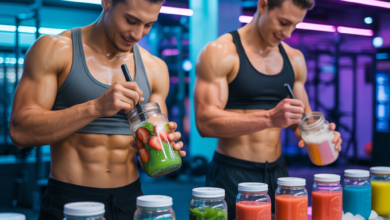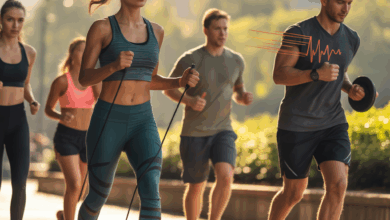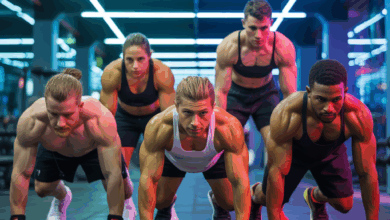Pre Workout Nutrition Tips

Ever walked into the gym hungry, shaky, or—worse—full and sluggish? You’re not alone. Whether you’re training for a marathon, trying to hit a new squat PR, or squeezing in a lunchtime HIIT session, the food you eat before a workout can make or break performance. These practical pre workout nutrition tips will help you train stronger, recover faster, and feel confident about fueling your sessions.
Why pre workout nutrition matters
Think of your body like a car: the right fuel gets you farther, faster. Pre-exercise meals and snacks top off glycogen (muscle carbohydrate stores), stabilize blood sugar, and provide amino acids for muscle support. Good pre workout nutrition also reduces perceived exertion—so a tough set feels more manageable—and improves focus and coordination during complex lifts or fast-paced drills.
Basic principles: timing, macros, and portion sizes
Timing: match your meal to your clock
- 2–3 hours before: A balanced meal with carbs, protein, and some fat. Ideal for steady energy during long or intense workouts.
- 30–60 minutes before: A small, mostly carbohydrate snack with a little protein. Choose low-fiber, low-fat options to avoid stomach upset.
- Under 30 minutes: Liquid carbs or an easily digestible gel or sports drink if you need quick energy (commonly used by endurance athletes).
Macros: what to emphasize
Focus on carbohydrates for immediate energy, moderate protein for muscle support, and minimal fats and fiber right before exercise to reduce gastrointestinal discomfort. A general guideline:
- Carbs: 30–60 g for shorter sessions; 60–90 g per hour for long endurance workouts (if tolerated).
- Protein: 10–25 g before resistance work helps with muscle protein synthesis.
- Fats & fiber: keep low within an hour of training.
Portion sizes and personal adjustment
Portion depends on body size, training intensity, and goals. Start conservative—one fist-sized portion of carbs + one palm-sized protein—and adjust up or down based on how you feel in training. Track which combos leave you energized versus bloated and stick with what works.
Pre workout nutrition tips for different workouts
Strength training (weights, cross-training)
- 2–3 hours prior: Grilled chicken, brown rice, and roasted veggies (moderate carbs + lean protein).
- 30–60 minutes prior: Banana and a scoop of Greek yogurt or a small protein shake.
- Why it works: Carbs fuel the ATP systems used in short, intense lifts; protein supplies amino acids for repair.
HIIT and circuit training
- 2 hours prior: Oatmeal with berries and a spoon of nut butter.
- 30 minutes prior: Rice cake with honey or a small fruit smoothie.
- Why it works: Fast-access carbs help sustain repeated bursts of effort, preventing energy crashes mid-circuit.
Endurance sessions (running, cycling, long classes)
- 3–4 hours prior: Pasta with lean protein or a substantial sandwich with avocado for longer runs.
- 30–60 minutes prior: A sports drink or a banana for runs under 90 minutes.
- Why it works: Glycogen stores are crucial for endurance; topping off carbs prevents hitting the wall.
Hydration, caffeine, and supplements — what to consider
Hydration is part of pre workout preparation. Aim for 16–20 ounces (about 500–600 ml) of water in the two hours before exercise, and sip 8–10 ounces 10–20 minutes beforehand. If you sweat heavily or train in heat, include an electrolyte drink.
Caffeine can boost power, endurance, and focus when consumed 30–60 minutes before training (roughly 3–6 mg/kg body weight). Try coffee or a low-dose pre-workout supplement—with caution—and test timing during training, not on race day.
As for other supplements: creatine is best taken daily for strength gains, beta-alanine helps high-intensity work over time, and BCAAs are generally unnecessary if you eat sufficient protein. Always prioritize whole-food strategies first.
Practical tips and real-world examples
- Morning gym-goers: If you train early, try a quick 200–300 calorie snack—Greek yogurt with honey, a banana with almond butter, or a small smoothie with oats and protein powder. If you prefer fasted training, keep sessions light and monitor energy and recovery.
- Office lunchtime workouts: Pack a balanced pre-workout meal 2–3 hours before: turkey wrap with whole-grain tortilla and veggies, or a quinoa salad with chickpeas.
- Evening training after a long day: Eat a lighter snack 45–60 minutes before—toast with peanut butter and sliced banana—if you can’t have a full meal earlier.
- Travel and races: Stick to familiar foods to avoid GI upset. For early races, a bagel with jam or a banana and sports drink often work better than heavy meals.
Common mistakes to avoid
- Eating too close to workouts: Large, fatty, or high-fiber meals right before training often cause bloating and nausea.
- Ignoring hydration: Even mild dehydration reduces power and endurance.
- Relying on stimulants without testing: New supplements or high-caffeine pre-workouts can cause jitters or crashes.
- Not practicing fueling: Test meals and timing during training so you know what works on race or PR day.
Pre Workout Nutrition Tips: Quick checklist
- Plan your meal timing based on workout start time.
- Prioritize carbs + moderate protein; keep fats and fiber low right before exercise.
- Hydrate well in the 2 hours before training.
- Use caffeine strategically and test it ahead of important events.
- Adjust portions to match intensity, duration, and body size.
Frequently Asked Questions
A small, easily digestible carbohydrate snack is best—examples include a banana, a rice cake with honey, or a small smoothie. Add a bit of protein if you tolerate it (Greek yogurt or a protein shake) but avoid high-fat and high-fiber foods so you don’t feel sluggish or nauseous.
Yes, for many people light-to-moderate workouts can be done fasted, especially morning cardio. For high-intensity or long-duration sessions, fasting may reduce performance and increase muscle breakdown. Test fasted training on easy days and pay attention to energy and recovery.
Aim for about 16–20 ounces of fluid 2–3 hours before exercise, and another 8–10 ounces 10–20 minutes before starting. If you’re prone to heavy sweating, include electrolytes in pre-workout hydration.
Conclusion — Fuel better, train smarter
Pre workout nutrition tips aren’t one-size-fits-all, but the fundamentals are simple: time your food, prioritize carbohydrates and protein, hydrate, and practice what works for you. Start experimenting with the meal timing and food combos above to find the sweet spot for your energy, performance, and recovery.
Ready to put these tips into action? Try a 2-week experiment with adjusted pre-workout meals and track how you feel in training. For personalized plans and specific sample menus, check out our nutrition guides and explore tailored workout routines. For overall daily strategies, visit our wellness tips page.
Want more targeted guidance? Sign up for regular updates and sample meal plans to power your next session. Fuel well, train hard, and celebrate the progress.





